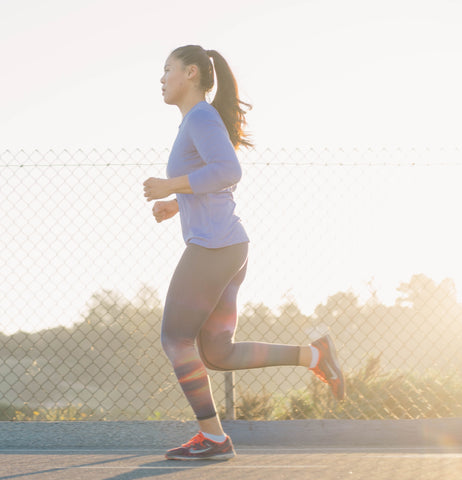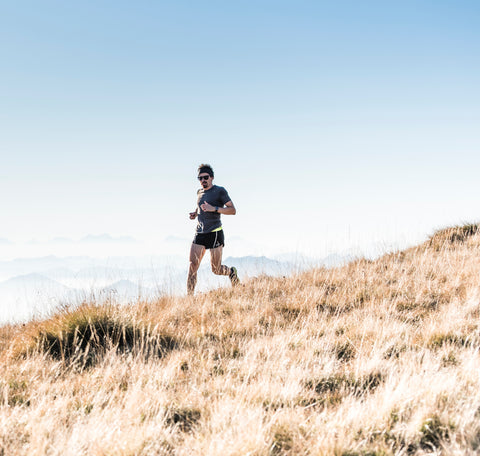
Runner's Diarrhea:
How to Stop Your Run From Becoming Suddenly Urgent

Possibly the most embarrassing issue you can face as a runner is being known not for your quick speed towards the finish line but rather for your fast pace in taking a quick detour during your run towards the nearest secluded tree or, best case scenario, toilet.
If this experience is familiar, you’re not alone—and there is help!
One Canadian study showed that 62% of participating long-distance runners reported having to stop during training to have a bowel movement. And 12% had had “fecal incontinence” while running. (Oh dear!)
Runner’s diarrhea, also known as runner’s trots, is a condition characterized by the frequent urgent need to pass loose, watery stools immediately after, or even during, a long-distance run. The gastrointestinal distress is not limited to diarrhea—other symptoms include gas, acid reflux, nausea, and cramping.
While the cause of runner’s trots is still not clear, the Mayo Clinic says five factors contribute to the condition:
What can you do?
Here are the A-B-Cs on how to prevent your healthy run from becoming an unpleasant case of “the runs.”
A. Anxiety Relief
To expand a bit more on the stress factor, according to a research paper published in the Journal of Sports Science, there exists a direct correlation between gastrointestinal problems in runners and the stress and anxiety levels experienced by runners during or before a race.
By observing 150 runners over a length of 30 days, it was found that runners who reported more stress and anxiety in their daily lives were more likely to suffer from frequent flatulence, stomach distress, mid-run pit stops, and so on while running.
To relieve your anxiety you can try meditation, or better yet, create your own pre-race ritual. If you have a structured pre-race plan, the familiarity of your routine can help calm you down. U.S. women's Olympic marathoner Desiree Davila has stated that having a journal and writing down her race-day plan the night before the race allows her to focus on the race day plan and stay focused.
B. Be Aware of Diet and Lifestyle
These seven simple dietary changes can help prevent runner's diarrhea:
In addition, lifestyle changes such as rethinking your running attire and wearing loose-fitting, comfortable clothing can significantly help as clothing that's too tight around the waist may aggravate your intestinal issues.
 You might also consider reducing the intensity or distance of your running routine until the diarrhea improves. You can gradually increase this activity as your signs and symptoms allow.
You might also consider reducing the intensity or distance of your running routine until the diarrhea improves. You can gradually increase this activity as your signs and symptoms allow.
C. Over-the-Counter Treatments
Avoid taking nonsteroidal anti-inflammatory drugs (NSAIDs) such as ibuprofen (Advil, Motrin IB, others) or naproxen (Aleve) before your run. Both have been shown to increase the incidence of gastrointestinal complaints.
While medication such as bismuth salicylate (Pepto Bismol) and loperamide (Imodium) might be an option to stop diarrhea, these treatments might be too harsh on your digestive system and might make you feel ill if you take them on an empty stomach.
Another reason to reconsider loperamide is that while it can stop diarrhea, it might also cause constipation as a side-effect. That’s why we recommend a more natural approach.
Fowler’s anti-diarrheal Oral Suspension provides fast relief of diarrhea and cramps, and acts without shutting down your digestive system or upsetting the beneficial bacteria in your bowels.
The active ingredient in Fowler’s is a natural-sourced clay called attapulgite which has proven to be significantly beneficial for gastrointestinal cramping and the control of bowel movements, and it’s safe to take for both children and adults.
Fowler’s works with your system reducing the number of bowel movements, improved consistency of loose or watery stools, and thus a relief from the gastrointestinal cramping that is often associated with diarrhea.
Run Embarrassment Free!
If you try the tips mentioned above you won’t have to worry about this problem getting the best of you. Whether it’s making some of the suggested lifestyle changes or doing something as simple as planning your race by writing in your journal, you can finally be free to run away from runner’s diarrhea!
Sources cited in this article:



Commentaires
Laisser un commentaireFowler's Digestive Health Team
Hi Jane, thanks for this helpful information. We agree there are things to do—and not do—about diarrhea. If you’re considering medication, the best approach is a natural non-systemic treatment that that acts without shutting down your digestive system or upsetting the beneficial bacteria in your bowels.
November 16, 2018
Jane Woods
If you’re suffering from diarrhea, a condition caused by things like bacteria, viruses, medication, foods, and various digestive disorders, there are things to do — and not do — so you can feel better fast. Diarrhea is defined as having three or more loose, watery stools a day. It’s unpleasant and can also be dangerous if left untreated. So if you have it, it’s a good bet you’ll want to get rid of it as quickly as possible. You can also refer to this article which states all the necessary details about diarrhea https://www.everydayhealth.com/diarrhea/treatment/dos-donts-treating-diarrhea-quick-relief/
November 16, 2018